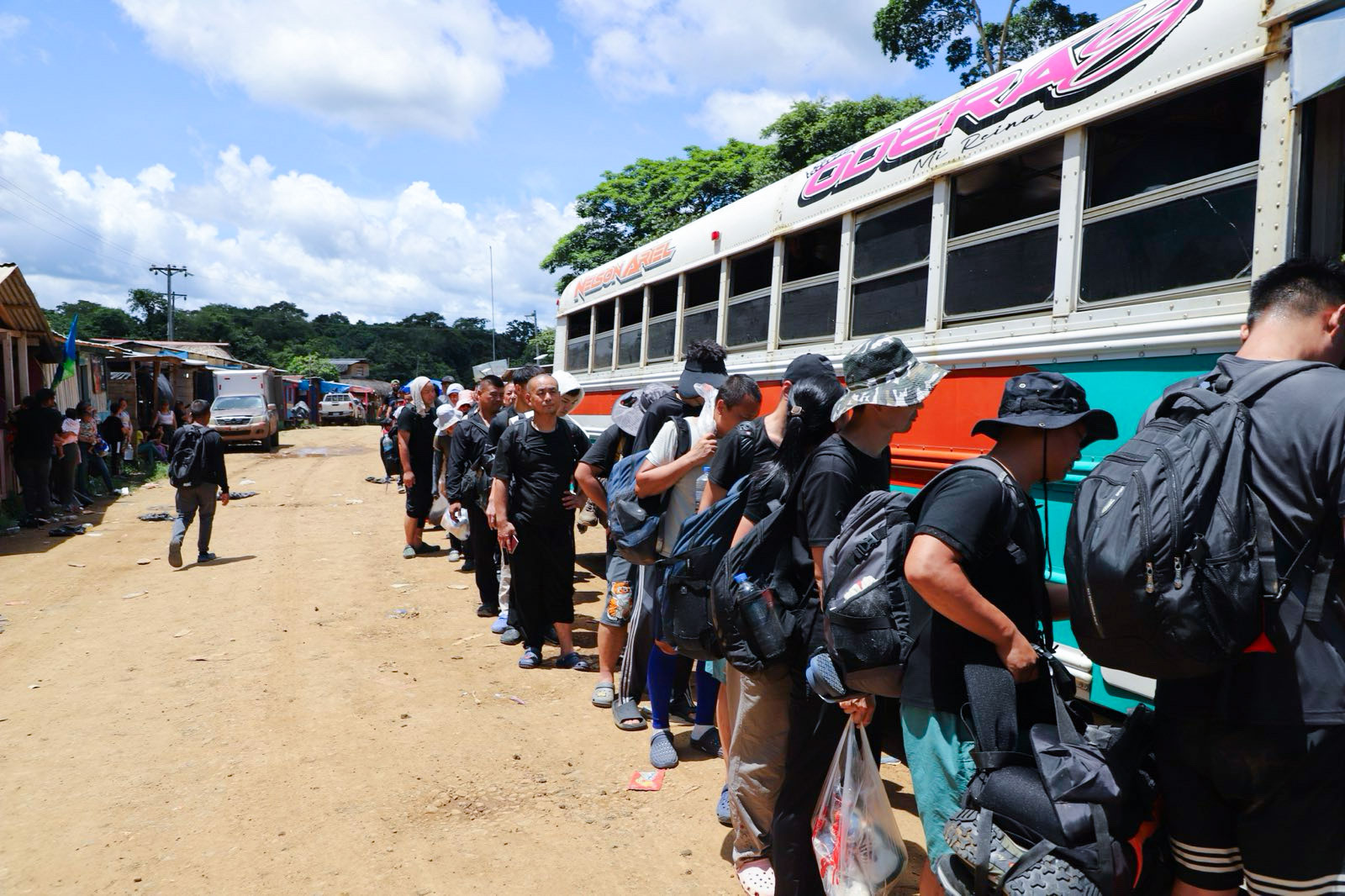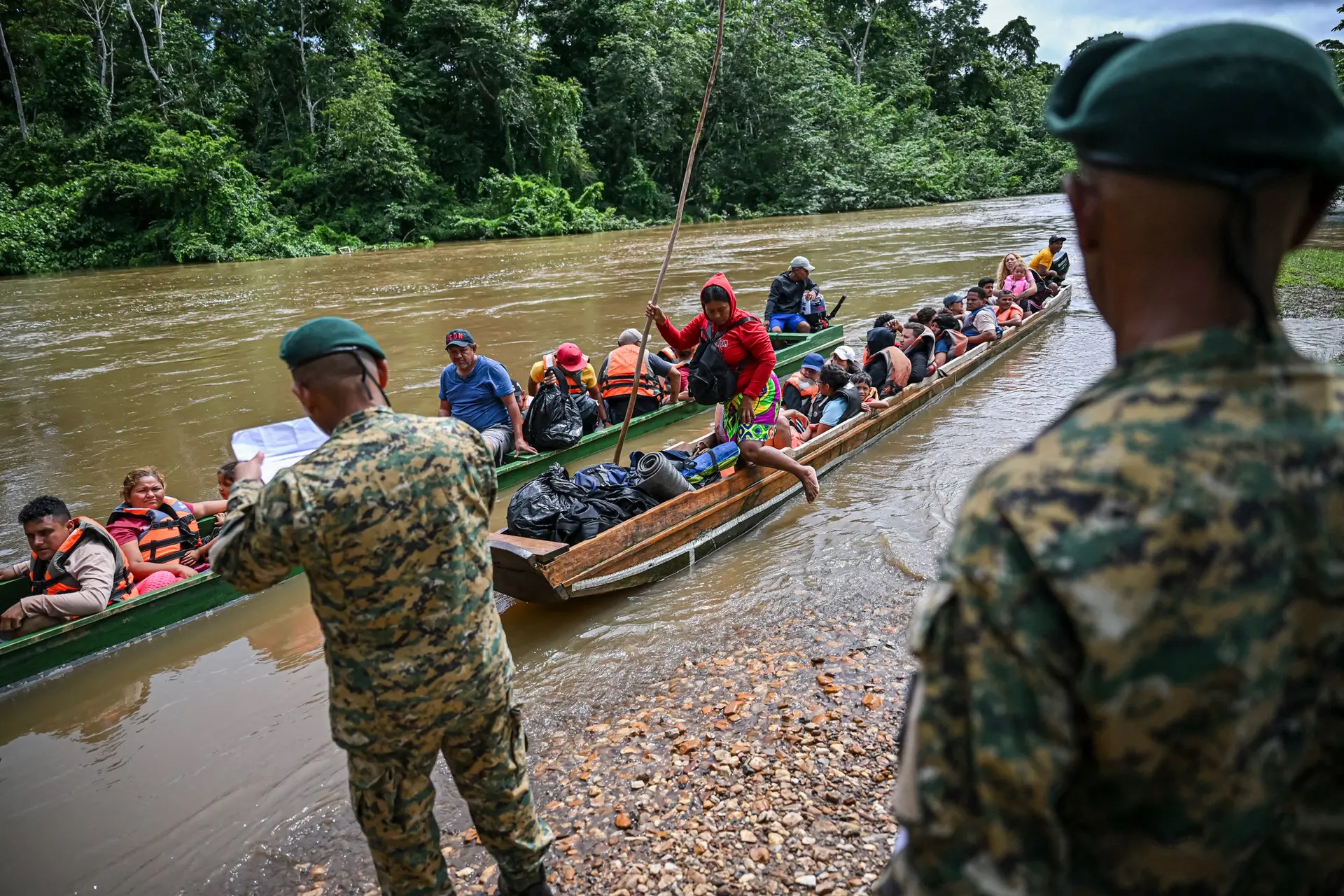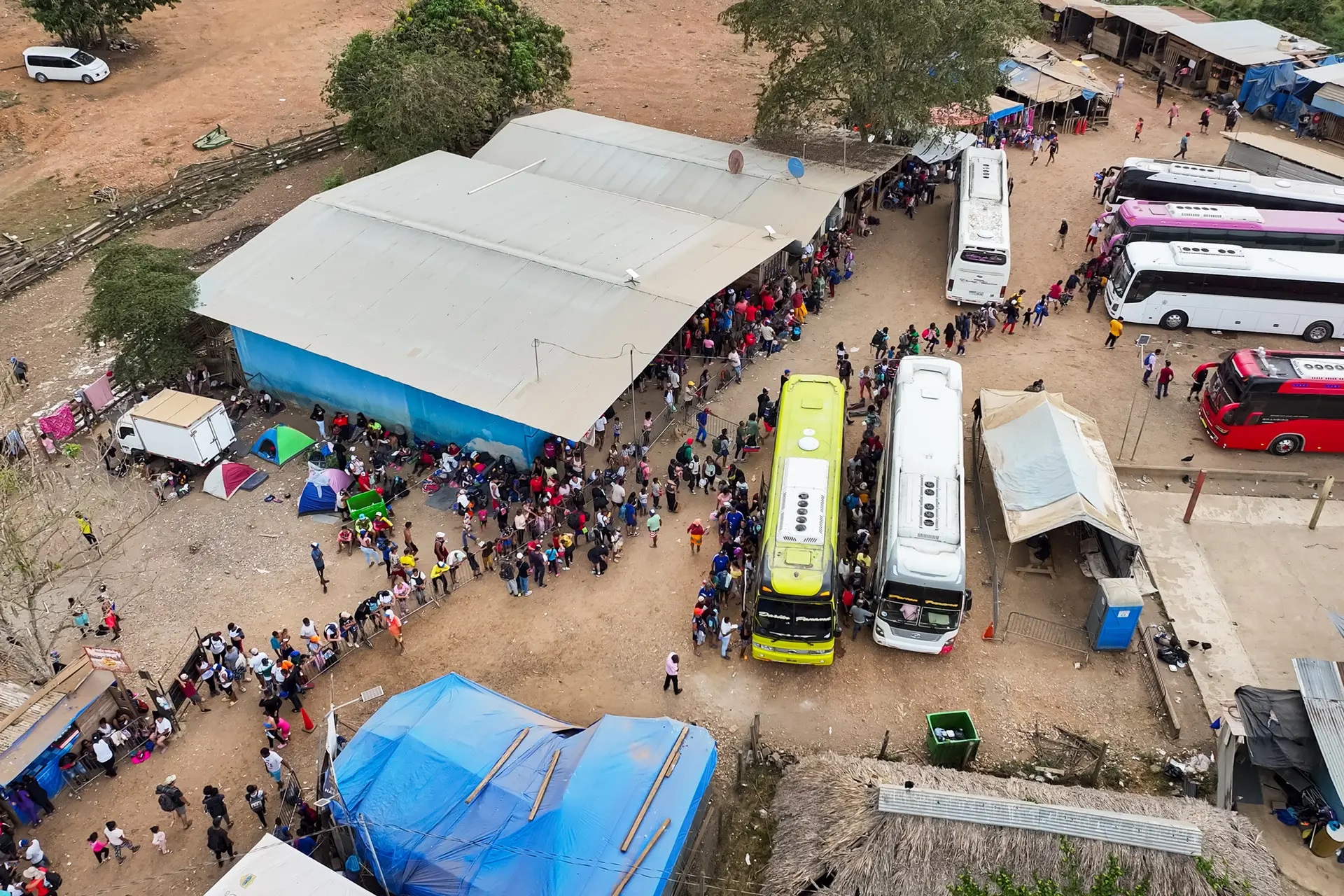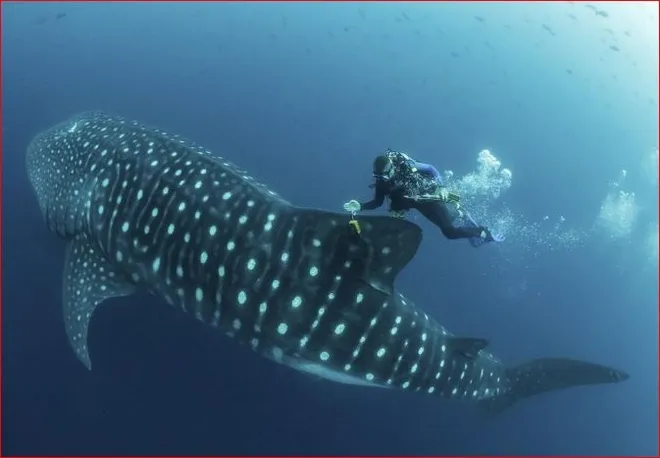Some Migrants Continue To Find Their Way Through the Darien Jungle

Pictured above, Chinese migrants at camp Canaán Membrillo in Panama load onto a bus in July 2024 for the next leg of their journey to cross the U.S. southern border illegally. The US pledges to support Panama in deportation flights for illegal immigrants on their way to the US border. Fearing that the new Panama President has blocked key routes to US, migrants are flooding the Darién Gap. Thousands of migrants streamed into Panama through the treacherous jungle of the Darién Gap last week, with many fearing that the route will be shut down permanently, thereby dashing their hopes of reaching the United States. The influx of migrants intent on crossing the U.S. southwest border unlawfully came as Panama’s new president, Jose Raúl Mulino, took steps to stop the flow through the Darién Gap. On July 1, the same day that he took office, Mr. Mulino forged a deal with the United States to pay for repatriation flights for migrants entering Panama on their way to the United States. Migrants expressed desperation and sometimes frustration at the idea that Panama would close the dangerous passageway from Colombia. In February, reporters visited the four migrant camps located in Panama, where migrants who had just made it out of the Darién Gap described lawless gangs, whose members robbed, raped, and murdered, along the route.
 Several migrants interviewed on-site last week said Panama should start accepting migrants who fly into the country or create another pathway to facilitate their journey to the United States. At least 1,000 migrants per day on average arrived at the camps the first week in July. Traffic dropped to roughly half that on July 5 as SENAFRONT, Panama’s national border patrol, began blocking jungle pathways using concertina wire, also known as razor wire. Video recordings posted on social media by a freelance reporter about the Darién Gap being blocked prompted an avalanche of questions and requests for help in Spanish. One social media user who said he had four children asked when the route would close because he wants to cross in late July, but he doesn’t yet have the money. Users posted pleas for help in guiding them through the Darién Gap or into Mexico. Some expressed disbelief that the passageway north was being shut down, while others cursed the news.
Several migrants interviewed on-site last week said Panama should start accepting migrants who fly into the country or create another pathway to facilitate their journey to the United States. At least 1,000 migrants per day on average arrived at the camps the first week in July. Traffic dropped to roughly half that on July 5 as SENAFRONT, Panama’s national border patrol, began blocking jungle pathways using concertina wire, also known as razor wire. Video recordings posted on social media by a freelance reporter about the Darién Gap being blocked prompted an avalanche of questions and requests for help in Spanish. One social media user who said he had four children asked when the route would close because he wants to cross in late July, but he doesn’t yet have the money. Users posted pleas for help in guiding them through the Darién Gap or into Mexico. Some expressed disbelief that the passageway north was being shut down, while others cursed the news.
 Above, the President of Panama Jose Raúl Mulino visits the Darien. Of the migrants exiting the Darién Gap over a four-day period last week, at least 700 were Chinese nationals who made their way into camp Canaán Membrillo in Panama. The more-affluent Chinese migrants use the Carreto route to get to Canaán Membrillo. The Carreto route is used by smuggling organizations to move migrants into Panamanian territory by sea before docking and taking a shorter jungle trail by foot. Several migrants who spoke with reporters and said they are making their journey to America now because they fear President Joe Biden’s term is ending. “He’s going, so I’m coming,” one Chinese migrant said. Two Chinese migrants cursed Chinese leader Xi Jinping and the Chinese Communist Party. The pair indicated that they wanted to go to the United States because of the freedom that its citizens enjoy, saying there are no human rights in China. Some migrants said family members had told them they could vote in the United States. One of the Chinese migrants said he would vote for former President Donald Trump if he could “because Trump is more tough” on the Chinese regime. He said he believes that some Chinese nationals crossing into the United States are Beijing spies.
Above, the President of Panama Jose Raúl Mulino visits the Darien. Of the migrants exiting the Darién Gap over a four-day period last week, at least 700 were Chinese nationals who made their way into camp Canaán Membrillo in Panama. The more-affluent Chinese migrants use the Carreto route to get to Canaán Membrillo. The Carreto route is used by smuggling organizations to move migrants into Panamanian territory by sea before docking and taking a shorter jungle trail by foot. Several migrants who spoke with reporters and said they are making their journey to America now because they fear President Joe Biden’s term is ending. “He’s going, so I’m coming,” one Chinese migrant said. Two Chinese migrants cursed Chinese leader Xi Jinping and the Chinese Communist Party. The pair indicated that they wanted to go to the United States because of the freedom that its citizens enjoy, saying there are no human rights in China. Some migrants said family members had told them they could vote in the United States. One of the Chinese migrants said he would vote for former President Donald Trump if he could “because Trump is more tough” on the Chinese regime. He said he believes that some Chinese nationals crossing into the United States are Beijing spies.
 Panama began placing razor wire inside the dense jungle, cutting off some routes used by human smugglers. Homeland Security Secretary Alejandro Mayorkas, who attended Mr. Mulino’s inauguration, signed a memorandum of understanding to provide assistance to Panama for illegal migrant repatriation flights out of the country. “As the United States continues to secure our borders and remove individuals without a legal basis to remain, we are grateful for our partnership with Panama to manage the historic levels of migration across the Western Hemisphere,” Mr. Mayorkas said in a statement about the deal. The agreement is “designed to jointly reduce the number of migrants being cruelly smuggled through the Darién, usually en route to the United States,” according to a statement from National Security Council spokesperson Adrienne Watson. Sending migrants back home “will help deter irregular migration in the region and at our southern border and halt the enrichment of malign smuggling networks that prey on vulnerable migrants,” she said. The United States agreed to supply Panama with equipment, transportation, and logistics to send migrants illegally entering Panama back to their countries. Panama has reported record numbers of crossings along the Darién jungle pathway in recent years, including more than 520,000 in 2023 alone.
Panama began placing razor wire inside the dense jungle, cutting off some routes used by human smugglers. Homeland Security Secretary Alejandro Mayorkas, who attended Mr. Mulino’s inauguration, signed a memorandum of understanding to provide assistance to Panama for illegal migrant repatriation flights out of the country. “As the United States continues to secure our borders and remove individuals without a legal basis to remain, we are grateful for our partnership with Panama to manage the historic levels of migration across the Western Hemisphere,” Mr. Mayorkas said in a statement about the deal. The agreement is “designed to jointly reduce the number of migrants being cruelly smuggled through the Darién, usually en route to the United States,” according to a statement from National Security Council spokesperson Adrienne Watson. Sending migrants back home “will help deter irregular migration in the region and at our southern border and halt the enrichment of malign smuggling networks that prey on vulnerable migrants,” she said. The United States agreed to supply Panama with equipment, transportation, and logistics to send migrants illegally entering Panama back to their countries. Panama has reported record numbers of crossings along the Darién jungle pathway in recent years, including more than 520,000 in 2023 alone.
 Mr. Mulino, the country’s 65-year-old former security minister and new president, promised to shut down the migration route controlled by criminal organizations. “I won’t allow Panama to be an open path for thousands of people who enter our country illegally, supported by an international organization related to drug trafficking and human trafficking,” he said during his inauguration speech. However, Panama will not be getting help from its neighbor Colombia. The Ombudsman’s Office of Colombia put out a statement cautioning Panama to not violate the “mobility rights” of migrants. Colombia’s notice warned its neighbor to not violate international law, which forbids countries from returning asylum seekers to places where they may face danger. Nongovernmental organizations (NGOs)—many of which have received millions in U.S. taxpayer dollars—embedded in Panama help migrants with food, shelter, medical aid, and maps at the migrant camps. One NGO, Human Rights Watch, cast doubt on Panama’s ability to close the Darién Gap completely and feared it would force migrants to find more dangerous routes. “Whatever the reason for their journey, migrants and asylum-seekers crossing the Darién Gap are entitled to basic safety and respect for their human rights along the way,” said Juanita Goebertus, Americas director of Human Rights Watch.
Mr. Mulino, the country’s 65-year-old former security minister and new president, promised to shut down the migration route controlled by criminal organizations. “I won’t allow Panama to be an open path for thousands of people who enter our country illegally, supported by an international organization related to drug trafficking and human trafficking,” he said during his inauguration speech. However, Panama will not be getting help from its neighbor Colombia. The Ombudsman’s Office of Colombia put out a statement cautioning Panama to not violate the “mobility rights” of migrants. Colombia’s notice warned its neighbor to not violate international law, which forbids countries from returning asylum seekers to places where they may face danger. Nongovernmental organizations (NGOs)—many of which have received millions in U.S. taxpayer dollars—embedded in Panama help migrants with food, shelter, medical aid, and maps at the migrant camps. One NGO, Human Rights Watch, cast doubt on Panama’s ability to close the Darién Gap completely and feared it would force migrants to find more dangerous routes. “Whatever the reason for their journey, migrants and asylum-seekers crossing the Darién Gap are entitled to basic safety and respect for their human rights along the way,” said Juanita Goebertus, Americas director of Human Rights Watch.






